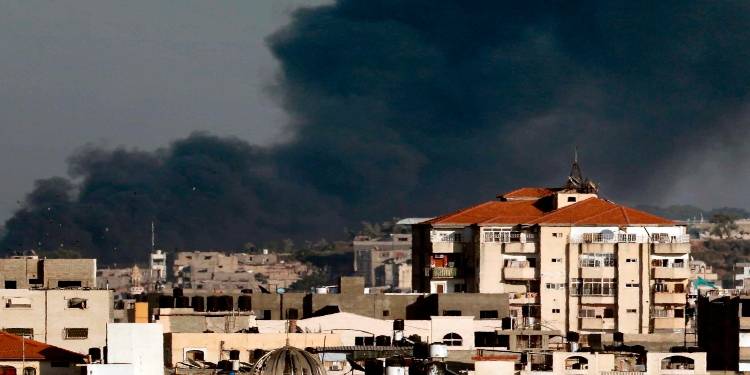
A ceasefire was implemented, ending five days of intense fighting between Gaza and Israel. The violence claimed the lives of at least 33 Palestinians in Gaza and two individuals in Israel.
Scheduled to commence at 10:00 pm local time, the ceasefire faced a last-minute barrage of rockets fired from Gaza towards Israel, prompting retaliatory airstrikes. However, most of the rockets were intercepted by Israeli air defenses.
With the ceasefire in place, the streets of Gaza, which had remained empty for days, saw cautious activity resume.
Egypt played a crucial role in brokering the ceasefire, gaining the agreement of both Israel and the Palestinian group Islamic Jihad. The Israeli ambassador expressed gratitude to Egyptian President Abdel Fattah al-Sisi for his dedicated efforts in securing the ceasefire.
Islamic Jihad confirmed its agreement to the ceasefire and expressed appreciation for Egypt's involvement. The recent escalation coincided with the funeral of Islamic Jihad's military commander, Iyad al-Hassani, and saw targeted airstrikes by Israel.
Throughout the conflict, the lives of people in Gaza and Israeli communities near the border were dominated by airstrikes and constant sirens warning of incoming rockets. Streets in the crowded Gaza Strip remained deserted, with only a handful of businesses open. Civilians on both sides expressed their anguish and questioned the rationale behind the violence.
The international community, including the United States, called for an immediate ceasefire to prevent further civilian casualties. Despite setbacks, Egypt persevered in its mediation efforts. The recent escalation resulted in casualties and significant damage, with both sides experiencing fatalities and engaging in extensive rocket exchanges.
The recent bout of violence marked the deadliest escalation in the Israeli-Palestinian conflict since August, inflicting considerable losses. Gaza, home to 2.3 million Palestinians, has long faced economic hardships and high unemployment due to the Israeli blockade implemented since Hamas took control in 2007.
The territory has witnessed multiple conflicts between militant groups and Israel over the years. The current wave of violence intensified following the return of Benjamin Netanyahu to power and the formation of a coalition government comprising right-wing and ultra-Orthodox parties.
Scheduled to commence at 10:00 pm local time, the ceasefire faced a last-minute barrage of rockets fired from Gaza towards Israel, prompting retaliatory airstrikes. However, most of the rockets were intercepted by Israeli air defenses.
With the ceasefire in place, the streets of Gaza, which had remained empty for days, saw cautious activity resume.
Egypt played a crucial role in brokering the ceasefire, gaining the agreement of both Israel and the Palestinian group Islamic Jihad. The Israeli ambassador expressed gratitude to Egyptian President Abdel Fattah al-Sisi for his dedicated efforts in securing the ceasefire.
Islamic Jihad confirmed its agreement to the ceasefire and expressed appreciation for Egypt's involvement. The recent escalation coincided with the funeral of Islamic Jihad's military commander, Iyad al-Hassani, and saw targeted airstrikes by Israel.
Throughout the conflict, the lives of people in Gaza and Israeli communities near the border were dominated by airstrikes and constant sirens warning of incoming rockets. Streets in the crowded Gaza Strip remained deserted, with only a handful of businesses open. Civilians on both sides expressed their anguish and questioned the rationale behind the violence.
The international community, including the United States, called for an immediate ceasefire to prevent further civilian casualties. Despite setbacks, Egypt persevered in its mediation efforts. The recent escalation resulted in casualties and significant damage, with both sides experiencing fatalities and engaging in extensive rocket exchanges.
The recent bout of violence marked the deadliest escalation in the Israeli-Palestinian conflict since August, inflicting considerable losses. Gaza, home to 2.3 million Palestinians, has long faced economic hardships and high unemployment due to the Israeli blockade implemented since Hamas took control in 2007.
The territory has witnessed multiple conflicts between militant groups and Israel over the years. The current wave of violence intensified following the return of Benjamin Netanyahu to power and the formation of a coalition government comprising right-wing and ultra-Orthodox parties.

